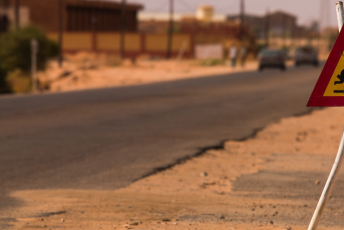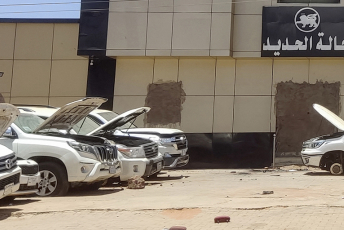A 2021 FAFT report, Money Laundering from Environmental Crime, states that illicit waste trafficking generates an estimated US$10 – 12 billion annually worldwide. Ghana plays a major role in this market, despite not having the means to recycle all the hazardous waste imported into the country. Around 150 000 tonnes of electronic waste each year are shipped to Ghana, legally and illegally.
While actors from developed Western economies profit most in the illegal criminal network, both Western and Ghanaian companies benefit from legal loopholes and corruption enabling their hazardous waste activities in the country.
Ghana’s Environmental Protection Agency (EPA) Project Coordinator Larry Kotoe told ENACT that a strong electronics repair industry was established in the early days of Ghana’s independence in 1957. Ghana has remained a key destination for hazardous waste, even though only a portion of the waste can be repaired.
Hazardous waste has dramatic health consequences for the local population and is devastating for the environment. To extract the copper from cables, the plastic wiring is burnt, releasing toxic polyvinyl chloride and brominated flame into the atmosphere. People living near the Agbogbloshie dumpsite in Accra are forced to inhale these toxic fumes daily and are at high risk of contracting diseases related to pollution or chemicals.
Hazardous waste criminal activity involves a wide network of actors, including government officials in many departments, criminal and mafia groups and corporations. Reportedly, no other form of organised crime provides as many opportunities for money laundering and tax fraud as hazardous waste.
A prime driver of this environmental crime is profit, as industries can make a lot of money by illegally disposing waste. Criminals and corporations can also easily overcome international treaties on international waste by falsifying or mislabelling genuine waste documents as recycling or second-hand goods.
Hazardous waste is facilitated by corruption and lack of care at exporting ports. Marco Antonelli, professor of political science at the University of Pisa, says: ‘If hazardous waste leaves European ports illegally, it’s because it’s easier to export illegally from [European ports] than to import to the European Union (EU).’ He says that while Europeans control what enters their soil, ‘they don’t care very much about what is exported from their countries’.
Corruption is exacerbated by a flexible law enforcement approach to hazardous waste globally. Currently, suspects of pollution crime are rarely charged with organised crime offences. And the lack of enforcement and low penalties allow organised criminal groups to continue their illegal activities and break environmental laws on a large scale.
Having said that, importing second-hand items is also a question of economic survival for many in Ghana, according to Green Advocacy Ghana. Hazardous waste generates jobs and income in a country where a significant proportion of the population is poor – according to the World Bank, 27% of Ghana’s population lives in poverty. For example, most students cannot afford to buy new computers, so they buy second-hand ones ‘cannibalised’ from old, imported machines. Without this alternative, many students would not be able to pursue their higher education.
‘It would therefore not only be political suicide for the government to put a total ban on these “cannibalised” computers, but members of parliament would not want to put a ban or vote for a law in favour of such a bill,’ says James Benjamin Gaisie from the Ghana Ports and Harbours Authority
Hazardous waste is regulated internationally by both the Basel and Bamako Conventions. The Basel Convention entered into force in 1992. Its main objective is to protect human health and the environment against the adverse effects of hazardous waste by regulating the transboundary movement and disposal of hazardous and other waste. Sometimes parties engage in bilateral or multilateral agreements on hazardous waste management with other parties or non-parties, under the condition that such agreements are ‘no less environmentally sound’ than the Basel Convention (Article 11).
The Bamako Convention, which came into force in 1998, was a response to Article 11 of the Basel Convention. Unlike the Basel Convention, the Bamako Convention imposes a total ban on all imports of hazardous wastes into Africa from non-contracting parties and, if they occur, they have to be considered illegal. Ghana has ratified only the Basel Convention.
Unlike the Bamako Convention, the Basel Convention excludes household waste from its scope. Since Ghana has not yet ratified the Bamako Convention, the import of household waste items, like television sets and refrigerators, is not prohibited. Moreover, as the EPA’s Kotoe and a scrap dealer in Agbogbloshie both told ENACT that there is no Ghanaian law forbidding citizens living abroad from bringing with them or sending containers of used appliances under the guise of ‘personal use’.
Ghana’s government acknowledges the hazardous waste problem. It developed the Hazardous and Electronic Waste Control and Management Act, 2016, and accompanying legislative instrument LI 2250, to create a legal framework for more sustainable waste management. Technical guidelines on the sustainable management of hazardous waste were developed under the Sustainable Recycling Industries programme.
A loophole in the Basel Convention allows parties to define waste for themselves. Yet the Bamako Convention has more constraints, prohibiting the importation of all hazardous waste unless the receiving country has the technical capacities to recycle it. Accra does not have all the required capacity, and seems to be choosing not to ratify the Bamako Convention due to these constraints. Interestingly, Kotoe acknowledges that the Bamako Convention is more protective of African countries’ national interests.
To address the current situation, a first step for Ghana would be to tighten controls on the movement of hazardous waste, with a principal focus on shipments mislabelled ‘second-hand’. This would require prioritising the issue at a leadership level. Operationally, this would be to gather information on and closely monitor the routes and condition of hazardous waste in the country and trace the routes involving organised crime.
The country’s national legislation and enforcement capacities must be strengthened, including equipping its seaports with more efficient technologies and training its ports’ personnel to detect hazardous waste.
National cooperation between enforcement agencies, customs, police, environment authorities and prosecutors to address waste crimes at the national level is crucial. With more punitive fines and longer sentences potentially serving as a deterrent for hazardous waste exporters and local counterparts.
So too, European ports must impose tighter controls on export shipments. The EU Regulation on waste shipments underlines the need to protect the environment. It aims to strengthen, simplify and specify the procedures for controlling waste shipments to improve environmental protection. However, waste trafficking continues at these ports aided by lack of care and corruption.
While recycling can have a positive impact on the environment, create jobs and generate income, hazardous waste trafficking remains a serious threat to Ghana. Unless it is tackled by both Ghana and exporting countries, Ghanaians and the country’s economy will remain hostage to this illegal recycling trade.
Abdelkader Abderrahmane, Senior Researcher, ENACT, West Africa, and Solomon Okai, Senior Programme Officer with Foundation for Security and Development in Africa (FOSDA)
Image: The Basel, Rotterdam and Stockholm Conventions/Flickr








